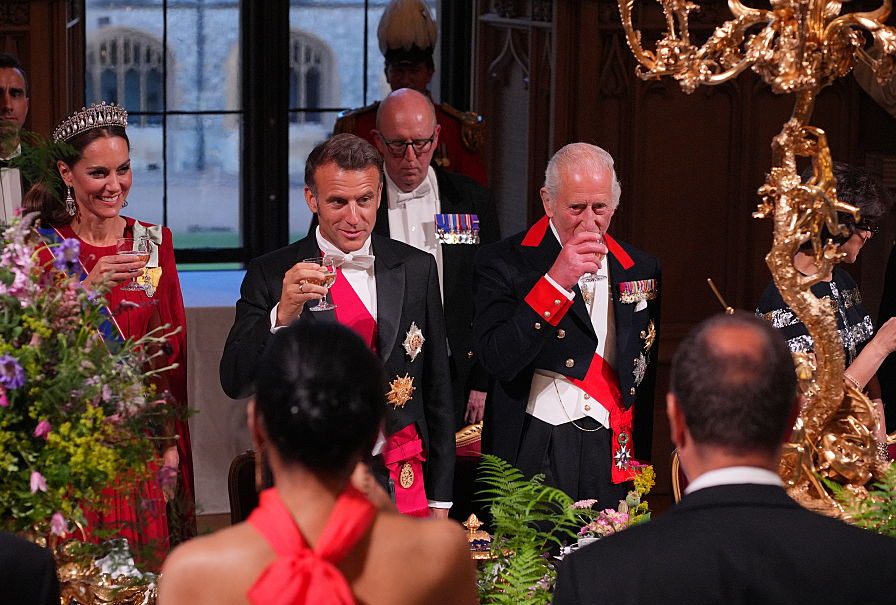As the once-promising bromance between King Charles and Keir Starmer appears to be fading, the monarch has found another leader on the world stage with whom he has a greater amount in common. As the state visit of the French President Emmanuel Macron gets underway with much earnest discussion about what this particular cross-Channel ‘special relationship’ involves (and a great deal of relief that Macron, unlike Donald Trump, can be trusted to behave himself and conduct himself with dignity and restraint on the world stage), the most important personal relationship is not that between Starmer and Macron, but between the Frenchman and the British king.
When Charles made his speech of welcome at Windsor Castle last night, cementing this more-than-cordiale entente, he spoke of how ‘our two countries face a multitude of complex threats, emanating from multiple directions’, but that ‘as friends and as allies, we face them together’.
Macron has had a warm relationship with Charles since he first became president
There were also some lighter, more epigrammatic remarks that had not been briefed beforehand. The King, who was clearly in his element, made jokes about Asterix, mused on the likelihood that the French would have regarded the idea of drinking English sparkling wine as impossible, and said that the two countries would ‘not be neighbours if we did not have our differences, with amicable competition and occasionally even, dare I say, confusion’. The speech went down well, and even the most die-hard republican would have to admit that the King had done himself and his country proud.
Last night’s festivities were not just about quips and one-liners: the presence of the Princess of Wales was a relief for many of the guests. This was the first state visit by the head of a European power since Brexit, and just as much of the Starmer premiership has been operating as a tacit apology for that particular schism, so Charles’s address can only be viewed as a pro-European one of unity, especially when he remarked, with apparent sincerity, about his ‘awe of France’s extraordinary attributes and achievements’.
Macron, whose own speech to Parliament was conspicuously well-received despite its at times challenging political content, has had a warm relationship with Charles since he first became president, when the King was still Prince of Wales. They have bonded over everything from environmental issues to a shared belief in the ceremonial aspects of sovereignty. It was, for example, particularly noticeable that when Macron hosted the King and Queen at Versailles in September 2023, he ensured that the royals were treated to a lavish banquet featuring everything from blue lobster to Pol Roger Cuvee Winston Churchill to drink.
Yet this visit occurs at a time of great international uncertainty and insecurity. So when Charles stated at last night’s state banquet that ‘these challenges know no borders: no fortress can protect us against them this time’, he was also quick to add that ‘our two nations share not only values, but also the tireless determination to act on them in the world’.
The day leading up to the speech had been one of great amiability between the two men and their wives right from the start of Macron’s arrival, all arm pats and back slaps amidst the smiles. There had been a carriage procession through Windsor for the quartet, followed by a lunch designed to showcase the royal collection of French treasures, before a return to London and Westminster Abbey.
It seems strange, considering Macron’s deeply Anglophile premiership, to consider that ‘Jupiter’, as he is now mockingly known, is regarded as a busted flush in his own country, clinging on until his presidency ends in May 2027. There is no such time check on the King’s reign, and Charles, who seems to be enjoying his newfound status as an interventionist and decidedly partisan monarch, is in a rare position of influence. This is not least because he speaks French almost fluently and can therefore converse with Macron – himself no slouch when it comes to English, as his hour-long address proved – with a degree of informality
There has been much hand-wringing discussion as to whether the King feels that the Trump state visit currently scheduled for September this year has been forced upon him by the over-eager government. But amidst all this there is little doubt that, whatever the private and public accord that takes place between Macron and Starmer, the key relationship – the special one, if you will – is between the head of a centuries-old constitutional monarchy and the president of a republic that long since decided to tear up the old ideas of kingship.
It was noted, gratefully, when the late Queen died that Macron stated, ‘To you, she was your queen. To us, she was the Queen.’ He intends to visit St George’s Chapel in a private visit this morning. Following this, there is to be a conspicuous mark of favour: the King will take Macron on a tour of his own horticultural enthusiasms, where he will be shown ‘areas of work on nature restoration and biodiversity within the gardens and the wider Great Park’.
Charles may be politically neutral, and any agreement on small boats and the like will be conducted separately by Starmer and Macron on their own. Yet as the King knows, soft power and the trappings of state can be just as important as any formal negotiation, and his well-received, well-judged Windsor speech will have done Britain – and him – no harm whatsoever in this most febrile of times. For this most green-fingered of monarchs, watching the seeds he has carefully planted and nurtured grow will be a most rewarding experience. And if he overshadows his prime minister, I doubt that he’ll be too heartbroken by that either.







Comments